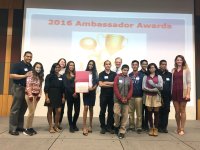A Student’s Perspective on SEL
An eighth grader shares what she has gained from a long-term social and emotional learning program.
We have a lot of research reports on social and emotional learning (SEL) and often hear the perspectives of researchers, educators, and policy makers. How about hearing from a student?
Jersey City’s public schools have faced some serious challenges, including being in a school district that just had local control restored after years of being administered by the state of New Jersey. The vast majority of students in the city’s public schools are low-income and experience a multitude of challenges that come with poverty.
In recent years, one Jersey City public school, PS 24 (better known as Watters School), has focused more on the whole child and has used a systematic social, emotional, and character development program in grades six through eight. In implementing this program—called MOSAIC (Mastering Our Skills and Inspiring Character)—the school has had the assistance of Rutgers University’s Social-Emotional and Character Development (SECD) Lab. (I am a codirector of this program.) The SECD Lab collaborated with Watters School to develop opportunities for students at the school to clarify their sense of positive purpose and develop social and emotional learning skills to support their purpose, and to provide opportunities for the youths to engage in social action for their classrooms, school, and larger community.
A Student’s Perspective
Pearl Filak is currently an eighth grader at Watters School and has attended the school since second grade. For Pearl, who has participated in MOSAIC since sixth grade, what has happened in the school has been transformative. In recent conversations with her principal and the MOSAIC consultant from the SECD Lab, Pearl shared insights about her journey: “If it wasn’t for my teachers and administrators saying, ‘You can do it, you have to do it, I believe in you,’ I would probably still be afraid and anxious,” she says. “But because of them, I am a better and changed person to this day.”
Pearl’s words are emblematic of the kind of encouragement students are offered at her school. She discussed other benefits that she and her classmates gained from MOSAIC: leadership and citizenship development, personal decision making, and problem-solving skills in the school or the community.
Self-Regulation and Motivation
MOSAIC focuses on motivation and self-regulation with students in a systematic, multiyear way that helps develop their interpersonal skills and their performance in academics and other aspects of school. In terms of turnaround in behavior, grades, and participation in school activities, particularly in the past year, Pearl explained for herself how the program helped: “At the end of last year, I saw some of my classmates losing their privileges, consistently getting in trouble, and I got tired of that. I remember saying to myself, “I don’t want to be seen like that.’ I decided right then and there that I would change.” Pearl went on to run for student council, and won. She also made honor roll.
Supportive Systems and School Climate
Pearl’s experience was similar to that of many other students who got involved in the variety of leadership opportunities at Watters School. What contributed to the grade improvements of many students and the pursuit of leadership roles? An intentionally heightened level of encouragement from teachers was put into play, for one thing. When asked about her teacher support system in the school, Pearl said, “Ms. Paulding, my math teacher, tells me all the time that this is my year. She believes I can do it. Ms. Demonaco, my language arts teacher, keeps pushing me. I used to give up on writing, but now I’m a good at writing poetry and essays. And my Spanish teacher will do anything to help me succeed. She wants to see me graduate on stage.”
Developing Relationships
Watters School has established a climate where students see new possibilities for themselves and are encouraged to take initiative. This year, for example, Pearl started an online book club with her teachers.
Pearl says that after purchasing the book The Girl I Used to Be at a book fair, “I remember showing Ms. McIntyre, my social studies teacher, and she agreed to read it with me. I challenged her to see who would finish it first. The book was about a girl whose mother died and her father was killed the same day. She made a lot of assumptions about what happened to her parents. She never really trusted anyone. She was the girl I used to be. I did not trust anyone, and I always assumed I would fail in life because the work was hard. I realized that the work is not hard, I just have to learn, and I trust my teachers to help me.”
Pearl posted a picture of the book on Twitter, and more of her teachers agreed to read it with her. “That was very inspiring,” she said. (You can follow Pearl at @pearl_filak and participate in her book club.)
Pearl explained that experiences like MOSAIC, the book club, student council, and other activities she now participates in “help me be independent, make good decisions, and achieve my goals.”
Watters School is working hard to actively encourage students’ sense of agency and purpose and to grow their SEL skills. These changes have resulted in a variety of positives for Pearl and many other students.
